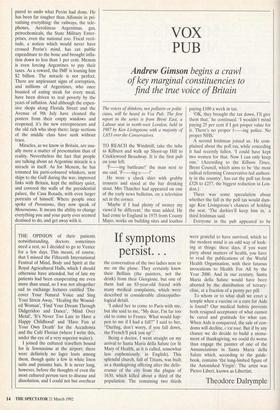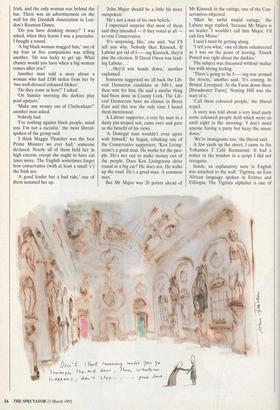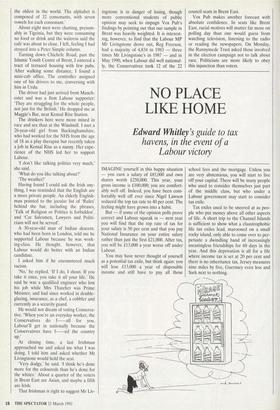VOX PUB
Andrew Gimson begins a crawl
of key marginal constituencies to find the true voice of Britain
The voices of drinkers, not pollsters or politi- cians, will be heard in Vox Pub. The first report in the series is from Brent East, a Labour seat in north-west London, held in 1987 by Ken Livingstone with a majority of 1,653 over the Conservatives.
TO REACH the Windmill, take the tube to Kilburn and walk up Shoot-up Hill to Cricklewood Broadway. It is the first pub on your left.
'F—ing battleaxe!' the man next to me said. 'F—ing c—!'
He wore a check shirt with grubby trousers and stood at the bar drinking stout. Mrs Thatcher had appeared on one of the early news bulletins, on a television set in the corner.
'Maybe if I had plenty of money my views'd be different,' the man added. He had come to England in 1975 from County Mayo, works on building sites and loathes paying £100 a week in tax.
'OK, they brought the tax down, I'll give them that,' he continued. 'I wouldn't mind paying 25 per cent if I got proper value for it. There's no proper f—ing police. No proper NHS.'
A second Irishman joined us. He com- plained about the poll tax, while conceding it had recently fallen. 'I could have kept two women for that. Now I can only keep one.' (According to the Kilburn Times, Brent Council, which aims to be 'the most radical reforming Conservative-led authori- ty in the country', has cut the poll tax from £328 to £257, the biggest reduction in Lon- don.)
There was some speculation about whether the fall in the poll tax would dam- age Ken Livingstone's chances of holding the seat. 'The darkies'll keep him in,' a third Irishman said.
Everyone in the pub appeared to be Irish, and the only woman was behind the bar. There was an advertisement on the wall for the Dundalk Association in Lon- don's Reunion Dance.
`Do you have drinking money?' I was asked, when they learnt I was a journalist. I bought a round.
'A big black woman mugged him,' one of my four or five companions was telling another. 'He was lucky to get up. What chance would you have when a big woman comes after you?'
Another man told a story about a woman who had £100 stolen from her by `two well-dressed coloured blokes'.
`Do they come in here?' I asked.
`On Sunday morning the darkies play pool upstairs.'
`Make any money out of Cheltenham?' another man asked.
Nobody had.
`I've nothing against black people, mind you. I'm not a racialist,' the most liberal- spoken of the group said.
`I think Maggie Thatcher was the best Prime Minister we ever had,' someone declared. Nearly all of them held her in high esteem, except she ought to have cut taxes more. The English sometimes forget how conservative (with at least a small 'c') the Irish are.
`A good leader but a bad ride,' one of them summed her up. `John Major should be a little bit more outspoken.'
`He's not a man of his own beliefs.'
I expressed surprise that most of them said they intended — if they voted at all to vote Conservative.
`It's surprising, like,' one said, 'but I'll tell you why. Nobody likes Kinnock. If Labour got rid of f—ing Kinnock, they'd piss the election. If David Owen was lead- ing Labour...'
they'd win hands down,' another explained.
Someone suggested we all back the Lib- eral Democrat candidate at 500-1, and then vote for him. He said a similar thing had been done in County Cork. The Lib- eral Democrats have no chance in Brent East and this was the only time I heard them mentioned.
A Labour supporter, a very fat man in a dusty pin-striped suit, came over and gave us the benefit of his views.
'A Donegal man wouldn't even agree with himself,' he began, rebuking one of the Conservative supporters. 'Ken Living- stone's a good man. He works for the peo- ple. He's not out to make money out of the people. Does Ken Livingstone drive round in a big car? He does not. He walks up the road. He's a good man. A common man.'
But Mr Major was 20 points ahead of Mr Kinnock in the ratings, one of the Con- servatives objected.
`Must be awful stupid ratings,' the Labour man replied, 'because Mr Major is no leader.° I wouldn't call him Major. I'd call him Minor.'
I said I must be getting along.
`I tell you what,' one of them volunteered as I was on the point of leaving. 'Enoch Powell was right about the darkies.'
The subject was discussed without malice but with strong feeling.
`There's going to be f—ing war around the streets,' another said. 'It's coming. In Bristol. Liverpool. At the Farm down there [Broadwater Farm]. Notting Hill was the start of it.'
`Call them coloured people,' the liberal urged.
A story was told about a very loud party some coloured people held which went on until eight in the morning: 'I don't mind anyone having a party but keep the music down.'
`We're immigrants too,' the liberal said.
A few yards up the street, I came to the Yohannes T Café Restaurant. It had a notice in the window in a script I did not recognise.
Inside, an explanatory note in English was attached to the wall: `Tigrinia, an East African language spoken in Eritrea and Ethiopia. The Tigrinia alphabet is one of the oldest in the world. The alphabet is composed of 32 consonants, with seven vowels for each consonant.'
About eight men were chatting, presum- ably in Tigrinia, but they were consuming no food or drink and the waitress said the café was about to close. I left, feeling I had strayed into a Peter Simple column.
Turning down Chichele Road, past the Islamic Youth Centre of Brent, I entered a tract of terraced housing with few pubs. After walking some distance, I found a mini-cab office. The controller assigned one of his drivers to me, conversing with him in Urdu.
The driver had just arrived from Manch- ester and was a firm Labour supporter: `They are struggling for the whole people, not just for the British.' He dropped me at Maggie's Bar, near Kensal Rise Station.
The drinkers here were more mixed in race and sex than at the Windmill. I met a 26-year-old girl from Buckinghamshire, who had worked for the NHS from the age of 18 as a play therapist but recently taken a job in Kensal Rise as a nanny. Her expe- rience of the NHS led her to support Labour.
'I don't like talking politics very much,' she said.
`What do you like talking about?'
`The weather!'
Having found I could ask the Irish any- thing, I was reminded that the English are a more private people. An elderly English- man pointed to the jocular list of 'Rules' behind the bar, including the phrases, `Talk of Religion or Politics is forbidden', and 'Car Salesmen, Lawyers and Politi- cians will not be served'.
A 30-year-old man of Indian descent, who had been born in London, told me he supported Labour because he was work- ing-class. He thought, however, that Labour would do better with an Indian candidate.
I asked him if he encountered much racism.
`No,' he replied. 'If I do, I shout. If you take it once, you take it all your life.' He said he was a qualified engineer who lost his job while Mrs Thatcher was Prime Minister, and had since worked in double- glazing, insurance, as a chef, a cobbler and currently as a security guard.
He would not dream of voting Conserva- tive. 'When you're an everyday worker, the Conservatives do f—all for you. Labour'll get in nationally because the Conservatives have f—ed the country up.'
At closing time, a last Irishman approached me and asked me what I was doing. I told him and asked whether Mr Livingstone would hold the seat.
`Very dodgy,' he said. 'I think he's done more for the coloureds than he's done for the whites.' About a quarter of the voters in Brent East are Asian, and maybe a fifth are Irish.
That Irishman is right to suggest Mr Liv-
ingstone is in danger of losing, though more conventional students of public opinion may seek to impugn Vox Pub's findings by pointing out that our sample in Brent was heavily weighted. It is interest- ing, however, to find that the Labour MP Mr Livingstone drove out, Reg Freeson, had a majority of 4,834 in 1983 — three times Mr Livingstone's in 1987 — and in May 1990, when Labour did well national- ly, the Conservatives took 12 of the 22 council seats in Brent East.
Vox Pub makes another forecast with absolute confidence. In seats like Brent East, racial motives will matter far more on polling day than one would guess from watching television, listening to the radio or reading the newspapers. On Monday, the Runnymede Trust asked those involved in the election campaign not to talk about race. Politicians are more likely to obey this injunction than voters.




























































 Previous page
Previous page